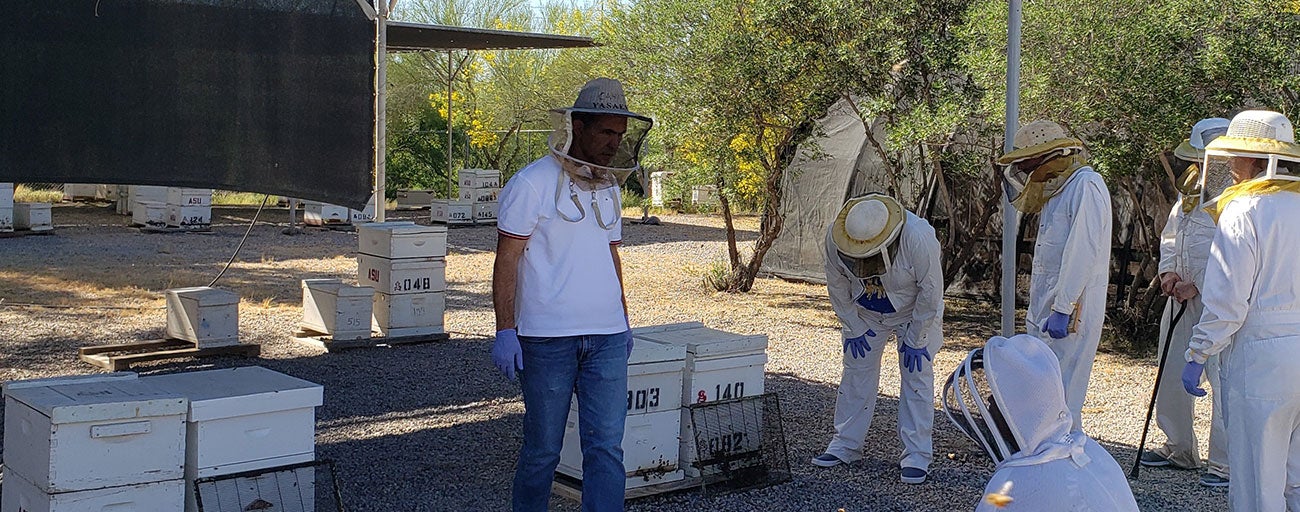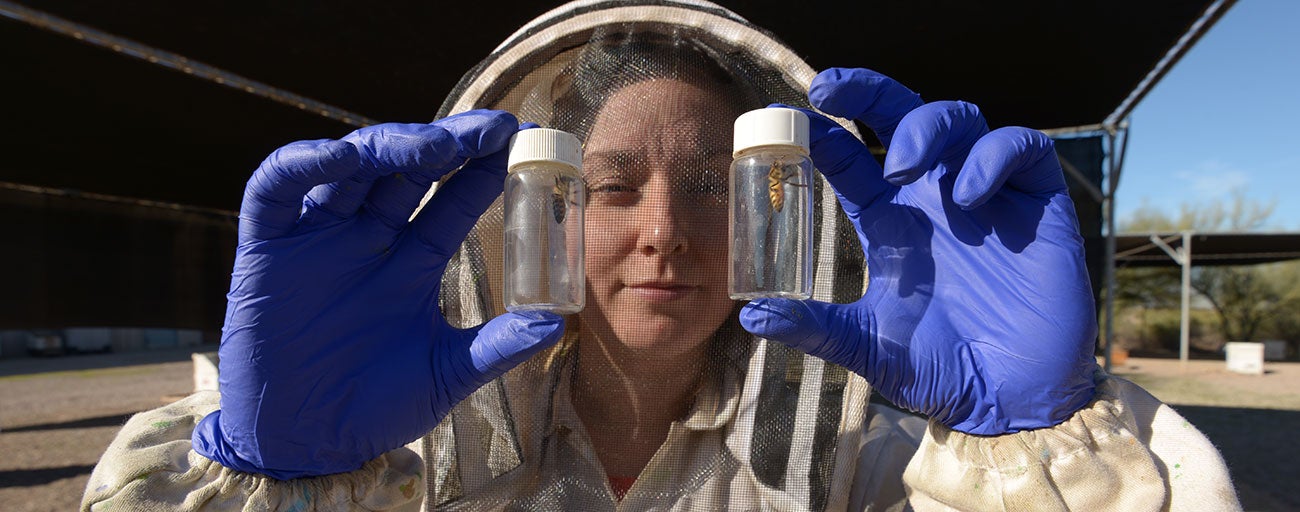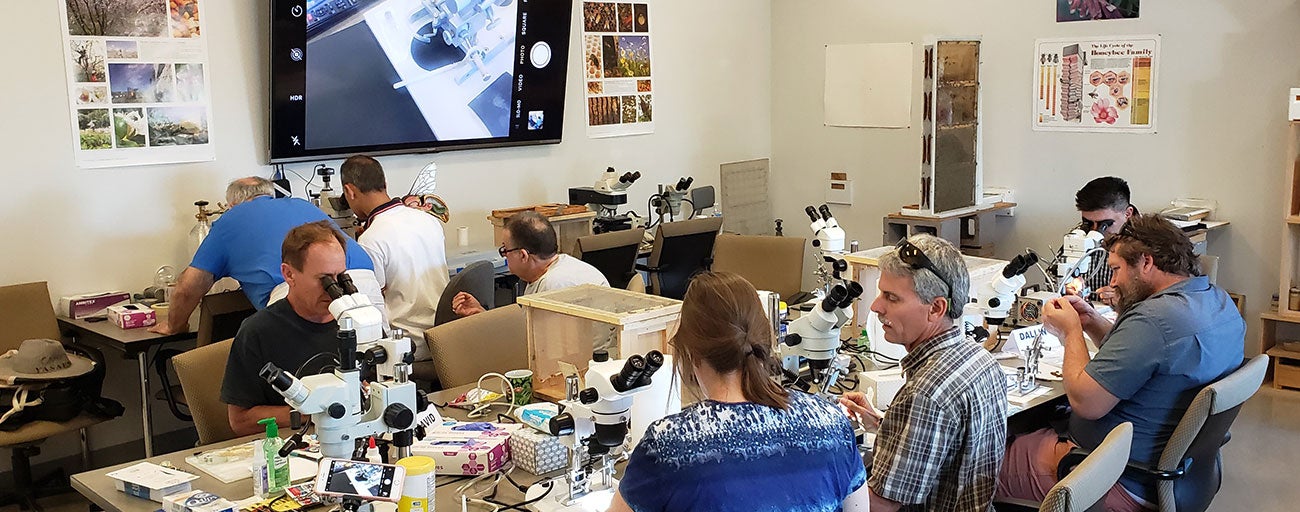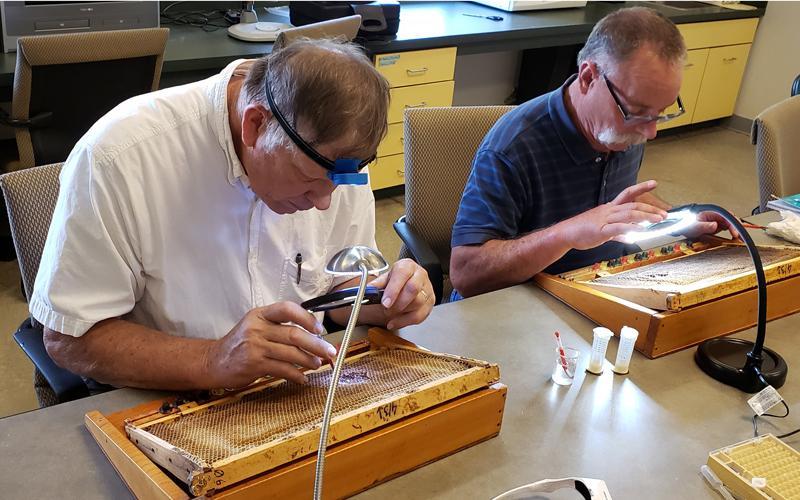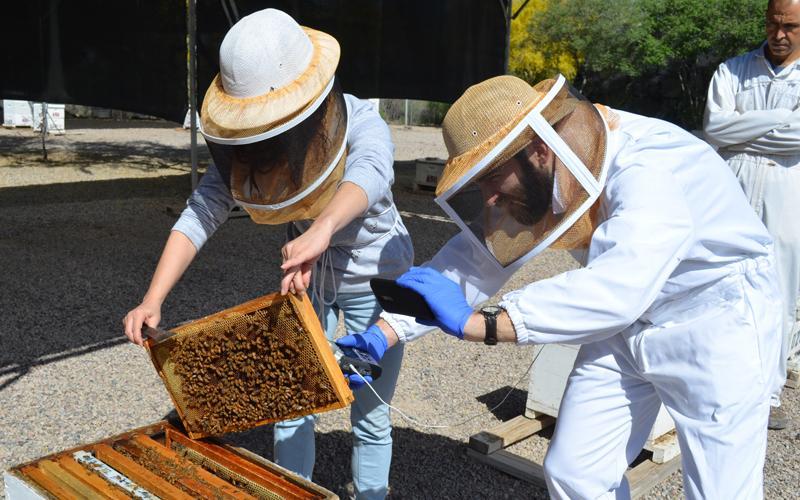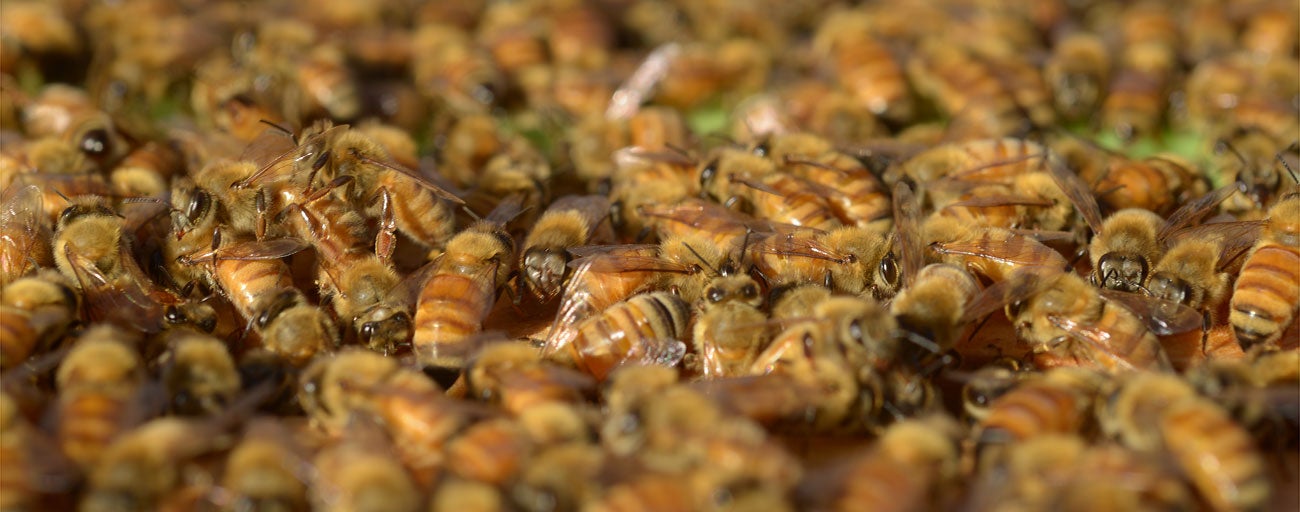
Hobby Beekeeping
Introductory to advanced beekeeping. Courses open to the public.
Becoming a beekeeper
Are you thinking about starting a backyard beehive? Wondering what it takes to start one and keep it healthy and growing?
Start by taking an introductory beekeeping course at the ASU School of Life Sciences bee lab.
Or, if you already know the basics and are ready to develop more advanced skills, we offer more technical classes including insemination of queen bees and queen rearing.
Did you know hobby beekeepers are helping the support the world's food supply by raising bees? Join us and find out more about our courses.
ASU offers range of courses for hobby beekeepers
Broadening beekeeping education
Honey bees serve as pollinators for the majority of the world’s crops, and their global decline threatens the world’s food supply.
However, hobby beekeepers have been helping to improve this by installing hives in their backyards. According to “Bee Culture” magazine, there are now more than 120,000 hobby beekeepers and a 3% rise in honey bee colonies, in the United States.
However, there are lots of factors to consider before starting a bee colony and lots to learn once you have it going. So, Arizona State University offers several continuing professional education courses on hobby beekeeping at the Honey Bee Research Lab on the Polytechnic campus, led by the School of Life Sciences manager of the facility, Cahit Ozturk.
The classes, which are one day for introductory classes and two days for advanced classes, are held on weekends during September and October and offer students a range of topics as well as the opportunity to take advantage of the equipment at one of the largest bee laboratories in the U.S.
“We have a really good environment here, so when it’s empty, I say we are wasting our resources,” Ozturk said. “We should share this with other people.”
For those with no experience, Ozturk offers an introduction to beekeeping and hobby beekeeping courses that teach the basics: how to start, where to get your colony, when to start, how to check for diseases and parasites, how to harvest your honey, and how to take care of your colonies.
More experienced beekeepers can take advantage of the advanced classes, such as instrumental insemination of queen bees, royal jelly production and queen rearing.
One of the biggest concerns of hobby beekeepers, especially in the south, is that their queens can breed with Africanized bees, making them more aggressive and difficult to handle.
“You need to change your queens every one or two years because young females lay more eggs and keep the colonies strong,” Ozturk said. “Otherwise, they will change the queen on their own and mate in flight, and we can’t control that. Africanized bees are good bees, but they are very aggressive. We have very gentle, Italian bees here, but the only way to keep those breeding lines pure is to control the mating.”
However, the inseminating a bee can be difficult and requires special, expensive equipment. Ozturk said that before beekeepers invest in this equipment, they want to be sure they can use it properly. Because of this, Ozturk invested personal funds in purchasing equipment for the advanced classes, which allows students to learn the skills and test the equipment before buying their own.
Of the seven students that took the class last semester, half left with an inseminated queen to add to their colony.
“Whether they were hobbyist or commercial beekeepers, Dr. Ozturk’s teaching method was well in tune with all of the people in the class. He provided assistance and instruction at the level needed for all and sincerely wanted you to leave his course having learned the techniques and skill necessary to be successful at instrumental insemination,” said Ed Russell, who traveled from the Florida Keys to take the class. “After the two days were over, Dr. Ozturk emphasized that he was available anytime to answer questions and provide assistance. I’ve never attended an ASU course before, but I do feel like I’m part of an ASU family now.”
By Melinda Weaver, Communications Specialist
Courses Offered Spring 2020
Why Bees Are Important and How You Can Help Them
- When: Feb. 15, Sat.
- Who: Anyone interested in learning about the importance of bees and how to help them.
- What: Honey bees are important pollinators of food crops that have helped humanity for as long as recorded history. We are losing 30-40% of bees every year. Honey bees are essential for humanity and will greatly benefit future generations. In this workshop, you'll learn the reasons behind declining bee populations and how you can help them.
- Where: ASU Bee Lab, 6858 E Old Pecos Road Mesa, AZ 85212
- Cost: Free.
Introduction to Beekeeping
- When: Feb. 29, Sat.
- Who: Anyone interested in starting beekeeping.
- What: Learn basic honey bee biology, how to start and maintain a honey bee colony, how to address common challenges for beekeepers.
- Where: ASU Bee Lab, 6858 E Old Pecos Road Mesa, AZ 85212
- Cost: $100.
Hobby Beekeeping
- When: TBD spring 2020, Sat.-Sun.
- Who: Anyone interested in learning about bees or beekeeping.
- What: Learn technical beekeeping skills and applying techniques to maintain healthy bee colonies as well as hands-on practice handling and managing a bee colony with the European colonies at the Honey Bee Research Lab.
- Where: ASU Bee Lab, 6858 E Old Pecos Road Mesa, AZ 85212
- Cost: $200.
How to Make Money With Bees
- When: May 2-3, Sat.-Sun.
- Who: Hobby beekeepers.
- What: Honey bees can be used as a pollination service and to produce many valuable products created by the hive. The most common products include honey, pollen, propolis, royal jelly, bee venom, bee wax, bee bread, Apilarnil, queen bees, package bees, split colonies, bee removal, and more.
- Where: ASU Bee Lab, 6858 E Old Pecos Road Mesa, AZ 85212
- Cost: $300.
Queen Bee Rearing
- When: March 28-29, Sat.-Sun.
- Who: Hobby and commercial beekeepers
- What: Learn to raise small or large-scale quality queen production. Learn to graft larvae for queen rearing, handle virgin and mated queens, mark and introduce a queen to the colony, and basic beekeeping techniques.
- Where: ASU Bee Lab, 6858 E Old Pecos Road Mesa, AZ 85212
- Cost: $200
Instrumental Insemination of Queen Bees
- When: April 4-5, Sat.-Sun.
- Who: Hobby and commercial beekeepers
- What: Learn how to use the tools of instrumental insemination, rear queens and drones, collect semen from drones, insemination techniques, evaluate the success of insemination.
- Where: ASU Bee Lab, 6858 E Old Pecos Road Mesa, AZ 85212
- Cost: $300.
